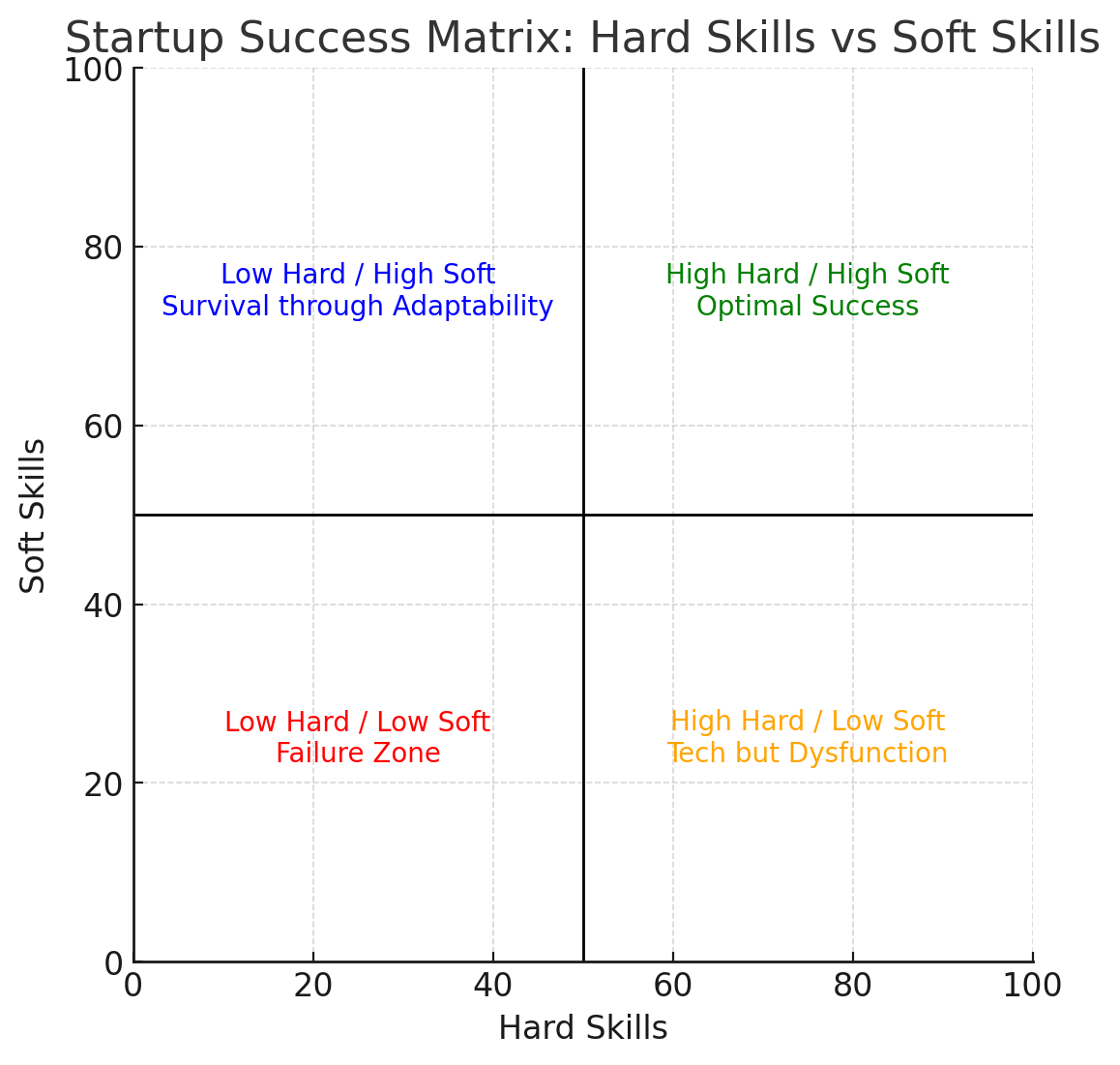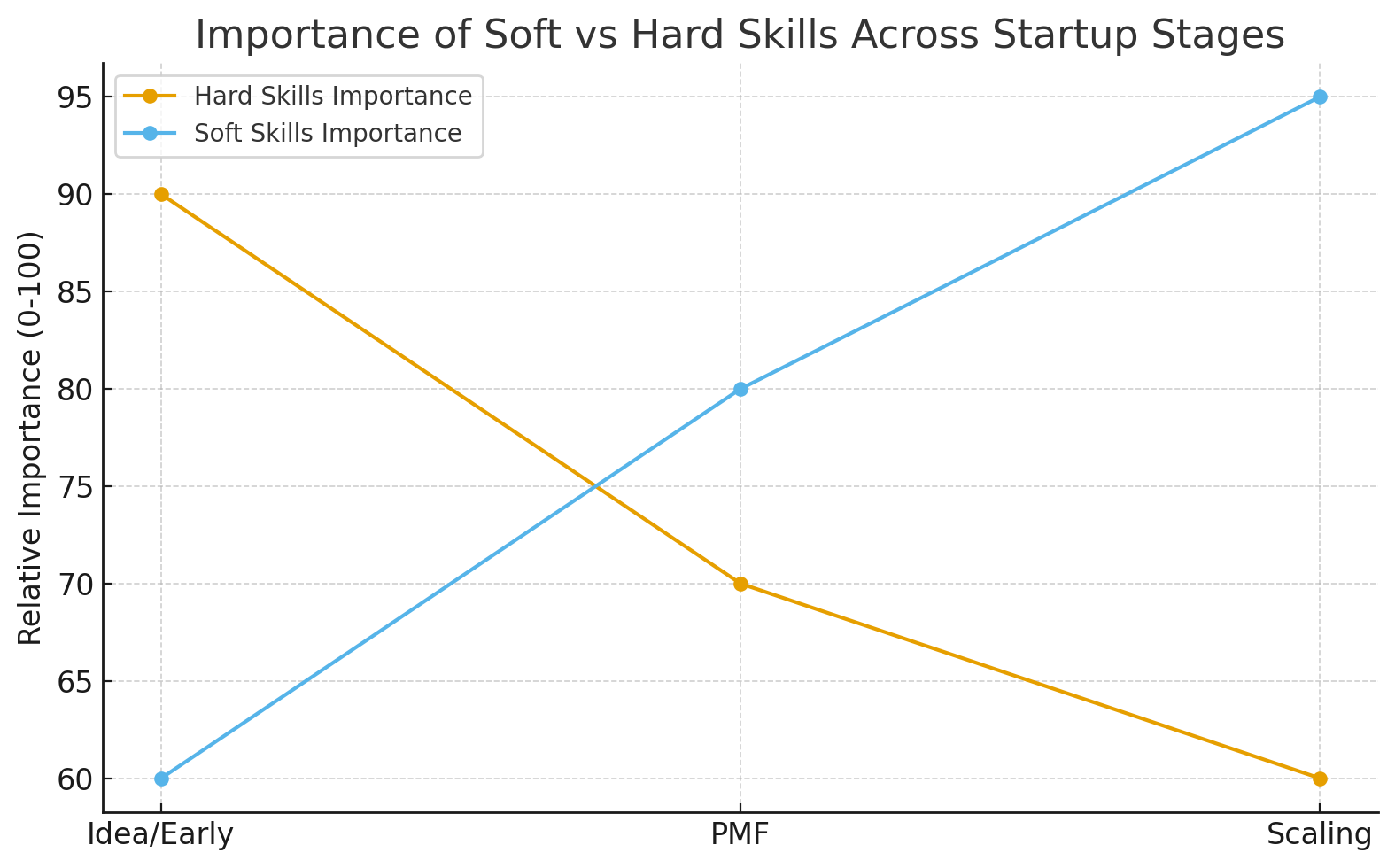Why Startups Need More Soft Skills Now Than Ever Before

In today’s entrepreneurial world, founders rush to hire the best developers, data scientists, and engineers they can find, believing that assembling a team of brilliant technologists is the most reliable path to success. Venture capital pitches highlight unique algorithms, cutting-edge software architectures, and product features that signal technical sophistication. This obsession with hard skills, those tangible, teachable, measurable abilities, makes sense at first glance, especially when a startup’s survival often depends on building a product quickly and credibly.
Yet, beneath the surface of every successful startup lies another, often overlooked dimension: soft skills. Communication, adaptability, emotional intelligence, resilience, collaboration, and leadership are less glamorous and harder to quantify, but they are arguably the real differentiators between startups that flame out and those that thrive. According to Forbes, eighty-four percent of managers and employees believe soft skills are as important as — or more important than — hard skills when determining workplace success. In the fast-moving, resource-constrained world of startups, that importance is amplified.
Startups operate under conditions of extreme uncertainty. The challenges they face are not just technical puzzles but also human ones: how to align a small team under pressure, how to resolve inevitable conflicts, how to inspire employees when resources are thin, how to pivot when customer feedback demands it, and how to negotiate with investors or partners who hold the keys to survival. None of these challenges can be solved by technical brilliance alone. They require emotional intelligence, persuasive communication, resilience in the face of failure, and leadership that inspires trust.
This article explores why startups need more soft skills than hard skills, what soft skills are, their importance in organizational life, trace which ones matter most at different stages of a startup’s growth, explore why they are often undervalued, and show how they ultimately determine whether a venture succeeds or fails. By weaving together research, examples, and visual frameworks, the goal is to demonstrate that while technical ability may build a product, it is soft skills that build a company.
Defining Soft Skills vs. Hard Skills
The terms “hard skills” and “soft skills” are often used casually, but the distinction between them is fundamental. Hard skills refer to technical or domain-specific abilities that can be taught, measured, and tested. These include programming languages, financial modeling, statistical analysis, design proficiency, or any other specialized expertise that is concrete and demonstrable. They are the skills that often appear first on résumés and in job postings because they can be verified through portfolios, tests, or certifications.
Soft skills, on the other hand, are less tangible. They describe how people interact, adapt, and respond within complex social and organizational systems. Communication, emotional intelligence, teamwork, adaptability, conflict resolution, and leadership all fall into this category. They are harder to measure but no less crucial. As McKinsey notes, soft skills are increasingly critical in modern workplaces because they cannot be easily automated or outsourced and are directly linked to organizational performance.
While hard skills allow individuals to perform specific tasks, soft skills determine how those tasks are approached, how teams collaborate around them, and how organizations adapt when conditions change. In startups, where uncertainty is the default and speed of learning is more valuable than rigid expertise, soft skills often matter more.
The Importance of Soft Skills in Organizations
In any organization, particularly in startups, soft skills are the invisible glue that holds people together. They influence culture, communication, decision-making, and resilience, all of which determine whether the group can function effectively.
- Strong communication prevents costly misunderstandings and ensures that limited resources are used efficiently.
- Adaptability allows teams to pivot when new information emerges, a common occurrence in the early days of a startup.
- Emotional intelligence helps leaders and employees manage stress, give and receive feedback constructively, and maintain trust during inevitable periods of uncertainty.
- Leadership, which is fundamentally a soft skill, is what inspires people to commit to a risky venture when safer employment options are available.
A technically brilliant team with poor communication may build features no one asked for, wasting months of effort. A startup with a toxic culture may lose talent faster than it can hire, draining both morale and capital. Conversely, a startup with modest technical resources but strong interpersonal abilities can survive longer, adapt faster, and attract partners or investors through trust and credibility.
Research repeatedly underscores this importance. A study published on arXiv, which analyzed more than 600 software job advertisements, found that soft skills such as communication and teamwork were among the most frequently requested qualities, alongside technical expertise. Similarly, EdgePoint Learning reports that 93 percent of employers consider soft skills either essential or very important when hiring. These statistics suggest that organizations increasingly recognize the role of interpersonal and adaptive abilities in driving long-term performance.
A useful framework is to imagine a quadrant graph. One axis measures hard skills, the other soft skills. Startups with low levels of both are doomed. Those with high hard skills but low soft skills may build impressive products but struggle with culture, scaling, and retention. Those with low hard skills but strong soft skills can sometimes survive longer by leveraging partnerships, outsourcing, or external help. The ideal, of course, is high competence in both, but the quadrant that is often most undervalued is high soft skills, which can compensate for technical gaps more effectively than the reverse.

A matrix showing the interplay between hard and soft skills in startups. High hard skills with low soft skills often lead to dysfunction despite strong products, while strong soft skills with modest technical ability can still support survival. Optimal success requires both.
Soft Skills Across Startup Stages
The soft skills a startup requires shift as it matures.
In the earliest stages, when the founding team is developing an idea and testing its viability, adaptability, curiosity, and resilience are paramount. Founders must be comfortable wearing multiple hats, switching between technical tasks, fundraising efforts, and customer interactions. Effective communication among the founding team is also critical, as disagreements about vision or strategy can derail progress before it even begins.
Once a startup reaches the product-market fit stage, customer empathy and the ability to interpret feedback become central. Teams must listen carefully to users, remain open to criticism, and collaborate effectively to refine the product. Conflict resolution and time management emerge as essential soft skills, ensuring that resources are allocated to the most pressing priorities without fracturing team cohesion.
In the scaling stage, soft skills take on a different dimension. Leadership becomes less about individual contribution and more about guiding, delegating, and mentoring others. Founders who once managed every detail must learn to trust new hires, communicate a coherent vision, and maintain organizational culture as the team grows. Change management, negotiation, and cross-team collaboration become essential as the startup begins to interact with external partners, regulators, and larger markets.
A simple way to visualize this evolution is through a chart where the importance of different soft skills rises or falls as a startup matures. Adaptability and communication remain consistently high, while skills like delegation and mentorship increase in importance later on. This progression illustrates that while hard skills remain necessary throughout, the weight of soft skills grows as startups transition from building products to building organizations.

The relative importance of hard skills and soft skills across different stages of a startup. While technical ability is crucial at the idea stage, soft skills rise in importance as startups reach product-market fit and begin to scale.
Why Soft Skills Are Overlooked
Despite their significance, soft skills are often undervalued by founders and early-stage startups. One reason is measurability. Hard skills can be tested with coding challenges, design portfolios, or financial models, whereas soft skills are more subjective and often only reveal themselves over time.
There is also a cultural bias in the startup ecosystem that glorifies technical brilliance. Founders, many of whom come from engineering or scientific backgrounds, often gravitate toward skills they understand and can assess more easily. Investors reinforce this bias by rewarding technical achievements — working prototypes, complex algorithms, or patents — over the less tangible elements of leadership or team cohesion.
Time pressure compounds the problem. Startups are under constant pressure to build quickly, demonstrate traction, and secure funding. In such contexts, hiring the developer who can immediately write production-ready code feels more urgent than hiring the communicator who ensures the entire team is aligned. The costs of neglecting soft skills — burnout, high turnover, miscommunication, or toxic culture — tend to surface later, making them easier to overlook in the short term.
Finally, there is the mistaken belief that soft skills are innate and unchangeable. While it is true that some individuals naturally excel in communication or empathy, research shows that soft skills can be developed through deliberate practice, coaching, and cultural reinforcement. The assumption that they cannot be taught or measured contributes to their undervaluation in the hiring process.
Building a Culture of Soft Skills
If soft skills are so important, the question becomes how startups can intentionally develop and nurture them.
One approach is to integrate them into the hiring process. Instead of focusing solely on technical tests, founders can design interviews that probe how candidates resolve conflicts, adapt to change, or handle feedback. References can be used to evaluate not only technical competence but also teamwork and leadership.
Cultural reinforcement is equally important. Founders and early employees set the tone for how communication, feedback, and decision-making are handled. By modeling openness, humility, and respect, leaders create norms that ripple outward as the team grows. Training and coaching, though often seen as luxuries in early-stage startups, can pay dividends in developing emotional intelligence and leadership capacity.
Finally, startups can treat soft skills as measurable priorities rather than abstract ideals. Employee satisfaction surveys, 360-degree reviews, and retention data can serve as proxies for cultural health. By rewarding not only individual achievement but also collaboration and mentorship, startups can ensure that soft skills are not sidelined in favor of immediate technical output.
Conclusion
Startups are built in environments of rapid change, scarce resources, and relentless pressure. In such conditions, hard skills may launch a product, but soft skills sustain the company behind it. Communication, adaptability, leadership, and emotional intelligence are what enable teams to weather uncertainty, align around shifting priorities, and scale without collapsing under their own weight.
The temptation to prioritize hard skills is understandable. They are easier to measure, easier to justify to investors, and often produce faster short-term results. But long-term success depends on more than code or algorithms. It depends on people, their ability to work together, to adapt, to lead, and to inspire. In this sense, startups that neglect soft skills may find themselves technically strong but strategically fragile, while those that cultivate them are more likely to endure, adapt, and ultimately succeed.
Read - Why the first 100 days can make or break your startup

square.jpg)










